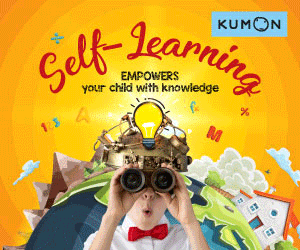IN today’s competitive world, the role of formal education has become one that ultimately seeks to create model students and upstanding citizens who can propel the nation and world forward through a lifetime of their achievements.
But at times, such a structured system can seem to be producing automatons, mediocre students who are products of a cookie-cutter concept.
And although comparing “factory schools” to production-line manufacturing processes may not seem too extreme, the fact that students are fed what to think than “how” to think is worrying for any parent.
Another way that complements the strict structured format used by most education systems is one that emphasises experiential knowledge, with students discovering solutions to the problems that they are presented with using their own intellect.
Also called cognitive learning, renowned American psychologist Jerome Bruner said that this “practice in discovering for oneself teaches one to acquire information in a way that makes that information more readily viable in problem solving” (Bruner, J. S. (1961). The act of discovery. Harvard Educational Review 31(1): pg21–32).
Developing problem-solving skills
The experiential method of learning encourages children to develop their own ability of identifying problems and looking for effective solutions on their own in their everyday lives.
Children can come across challenging situations when interacting with peers, stumble upon those via the Internet or simply while looking to solve an existing problem.
In doing so, they learn to rely on their own resources and actively look out for solutions, instead of waiting for the answers to be presented to them.
Being resourceful helps them become creative and adaptable to change in the environment. It also helps them realise that they can learn faster.
Creating experiences that matter
Self-learning comes from the personal desire to gain new knowledge. It is powered by the need to uncover more information on a topic and to use the information for a particular purpose.
Children would gain a clearer sense of purpose as the information they have gleaned would be relevant to them. They would also be more inclined to delve deeper in a certain topic as there is a clear sense of purpose in knowing – and it’s not simply for the sake of learning.
Learning becomes more purposeful for them, as well as being enjoyable, which leads to better results.
Encouraging a curious mindset
Effective learning largely calls for a sense of wanting to know – a curiosity towards exploring.
This propensity to “know more” is the drive that would even inspire them to become life-long learners. Children who are motivated to learn will seek to acquire more knowledge, for their drive stems from within themselves, rather than instigated by external persuasions.
For them, learning is an excitement akin to embarking on an adventure, one that expands capabilities even more as they successfully acquire new knowledge or skills.
Boosting self-esteem
Much of the motivation to self-learn comes from within, and although natural curiosity propels a child to seek answers to problems, the courage and confidence to “take one’s own path” can be lonely and daunting.
But as children practise more self-learning, they build their sense of confidence as they learn. They would come to trust their own judgement as they can see how that produces results for them.
It will not take them long to soon discover themselves as independent persons eager to pick up new things without anyone urging or helping them.
Learning at one’s own pace
Children who self learn do so at their own pace. That gives them the benefit of focusing on areas that they are more interested in or wish to understand better. In a way, it helps them specialise in certain details.
This practise reduces frustration, anxiety, or boredom; obstructions that normally beset students who attend a classroom setting.
In such situations, challenges and obstacles would not deter their drive to get things done; instead the challenges provide them new opportunities to learn something new.
Expanding peripheral skills
Part and parcel of self-learning is not only discovering the world surrounding the child – it’s also a revelation of his own abilities.
Children who learn through experience find ways to work faster and more efficiently, and that involves time management, self-assessment, and setting their own goals. These are important skills that are very much important later in their studying life and more so when they join the workforce.
In fact, kids who are adept at self-learning have more opportunities in developing other skills and they do so by developing one particular skill set as they go along. Self-learners also possess a strong commitment towards completing tasks and they stick to a plan until they achieve their goals.
A Kumon learning experience
A programme that encourages self-learning was developed by a Japanese high-school educator for his son back in 1954.
Toru Kumon developed Mathematics worksheets on loose papers so that his son Takeshi can learn to become more fully prepared to face the rigorous high school and college entrance exams in his future.
Today the Kumon Method has helped students worldwide to develop an enquiring mind and independence through self-learning, fostering a generation of well-rounded students who are resourceful and confident to take on challenges without fear.
Kumon will be providing free trial classes from March 16-27 to those who are interested in helping their children develop as better thinkers.
Find out how these trial classes can benefit your child by contacting a Kumon centre nearest you. Call 1-800 881 010 and register before Mar 16, or visit www.kumonmalaysia.com









